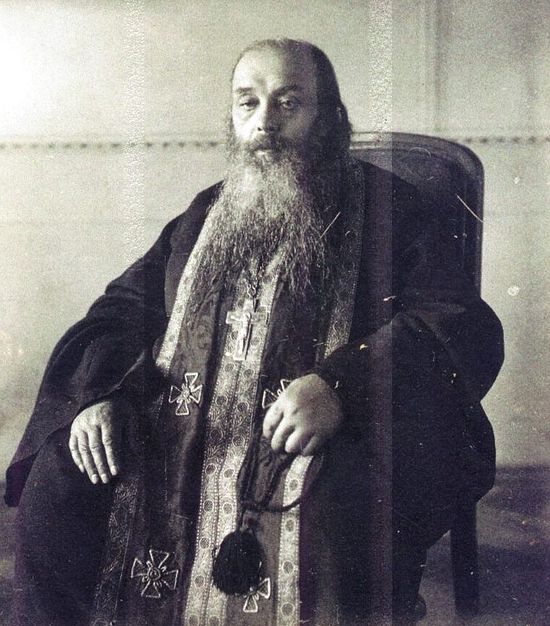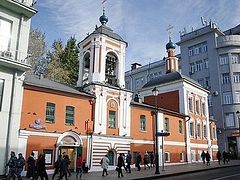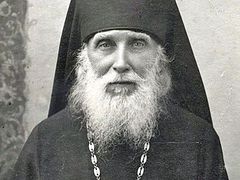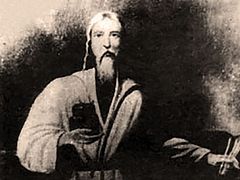Venerable Aristokly (Amvrosiev; 1838—1918; feast: August 24/September 6) of Mt. Athos and Moscow is one of the most popular saints among Muscovites. Fifteen years ago his relics were uncovered at the Danilovsky Cemetery and translated from St. Daniel’s Monastery to the Athonite Metochion in Moscow (6 Goncharnaya Street), where they have rested ever since.
Bishop Alexei (Polikarpov) of Solnechnogorsk, Abbot of St. Daniel’s Monastery in Moscow, shares the oral traditions of people’s communication with Schema-Hieromonk Aristokly, his blessings, miracles, and prophecies.
I knew one nun who in her youth associated with Elder Aristokly. It was shortly before the Revolution, but she sought the monastic life. Her name was Mother Panteleimona, and she was tonsured at the end of her life. She said that her father was the owner of a fringe-weaving workshop, and they lived in the village of Iksha near Dmitrov [an ancient picturesque town forty miles north of Moscow.—Trans.]. Her parents wanted to introduce her to a young man, but she thought, “What if I fall in love with him after meeting him?” So she decided first to go to the elder and ask for his blessing to enter a convent. Schema-Hieromonk Aristokly would receive the faithful in a large room of the metochion of the Russian Athonite St. Panteleimon’s Monastery in Moscow, which before the Revolution was situated at Polyanka Street. His legs hurt, so he received people sitting down. Visitors would come up to him in turn and kneel down beside him. When the future Mother Panteleimona (her secular name was Evdokia/Eudocia) was waiting for her turn, a girl in dark clothing came up to the elder before her and asked for his blessing to become a nun.
But Fr. Aristokly said:
“No, you shouldn’t join a convent.”
But the girl persisted.
“Don’t go there!” he went on angrily. “After spending three or four months there you will leave the convent and bring shame on it! Don’t do it!”
Meanwhile, Evdokia was standing and trembling: “What is he going to say to me? What if he tells me the same?...”
“And you may join a convent. But not a convent in the city…”
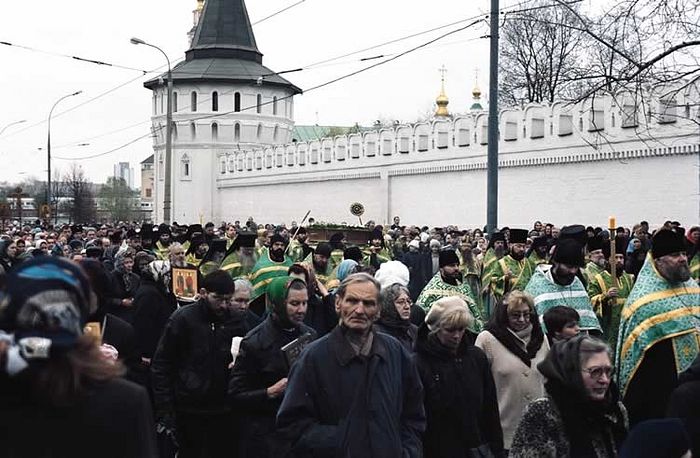 The translation of St. Aristokly’s relics in 2004
The translation of St. Aristokly’s relics in 2004
So she went to a convent in Filimonki1 in the Odintsovo district near Moscow. This is how elders could predict people’s destinies! Though, as she said, that convent was later closed. The sisters lived in apartments in different places. She moved to the Convent of the Icon of the Savior “Not Made by Hands” and the Blachernae Icon of the Theotokos2, which was restored not long ago too. But then it was closed as well. One nun, Mother Agrippina, was brought to the Tourist station, and she said:
“What will I do here alone?”
“You won’t be alone!” she was answered.
And indeed all the sisters were gathered there. They were sent far to the north—to the surroundings of Plesetsk in the Arkhangelsk region—to fell trees in the forest. As Mother Panteleimona related, no nun was killed by a falling tree, though there were fatal accidents among secular inmates.
She also recounted how on the first day they were brought to the camp barracks, with “religious inmates” on one side and real criminals on the other side. No place for the future Mother Panteleimona (then still Evdokia) was found among her sisters, so she had to be accommodated alongside the opposite contingency. She had a very favorable impact on one of her mates and quietened her on many occasions. Whenever the latter lost her self-control and took a knife into her hands, everybody would rush towards Mother Panteleimona, crying, “Evdokia, please calm her down!”
Afterwards, on returning from exile Mother Panteleimona lived in a shared apartment. It seems the neighbors were up in arms against her there, but she pacified and reconciled all of them by her love and compassion. So later, when they were settled in various different places, they wept for her as if she were family…
Since Mother Panteleimona had problems with her spine, it was extremely difficult for her to fell trees in the camp. So together with another sister she went to Vladyka Eusebius of Kronstadt, who was exiled with them, to ask for his blessing to learn to become nurses so they could be relieved from hard work. The hierarch said:
“Not nurses, but sisters of charity!”3 and he blessed them.
So it was there, in the camp, that she learned basic medical skills. Later she returned from the camp and served as head nurse at Dmitrov town hospital for many years. She received the monastic tonsure before her death. Such a quiet and humble person she was. Everybody would ask her, “Mother, why were you not tonsured before?” And she would reply humbly: “Because no one offered it to me.”
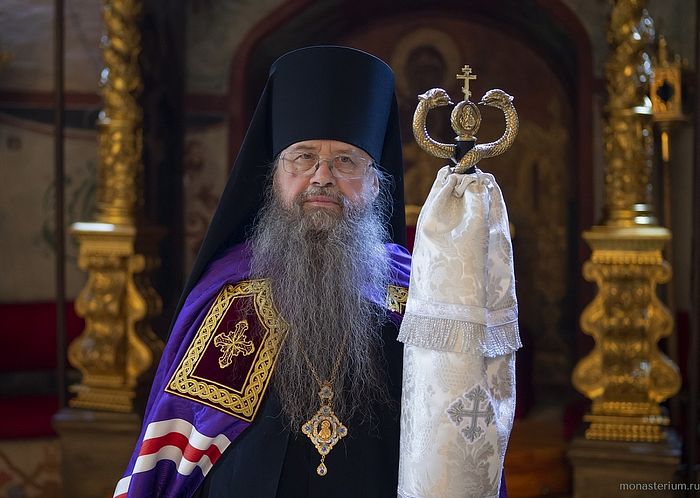 Bishop Alexei (Polikarpov) of Solnechnogorsk
Bishop Alexei (Polikarpov) of Solnechnogorsk
As for Venerable Aristokly, before becoming a monk he had lived as a middle-class resident of the city of Orenburg and had a wife. Widowed, he went to the Russian St. Panteleimon’s Monastery on Mt. Athos. There he was tonsured and received the name Aristokly. At that time it was the custom there to send their brethren to Moscow to perform various obediences. He worked much for the good of both the monastery and people. He would bring holy relics from the Holy Mountain for the sick and afflicted, healing multitudes of people. After meeting this spiritual elder people never broke contact with him. He corresponded with his spiritual children all the time. He labored and prayed much, giving spiritual care to people. He cured those who suffered from various diseases, performing miracles and healing hundreds of people.
A spiritual daughter of Elder Aristokly fell seriously ill. Her legs were paralyzed. Then the elder came to see and comfort her. After spending some time with her, he blessed her and said before leaving:
“Well, my beloved child, I must go. Don’t lose heart, but pray and thank the Lord. When I leave, go up to the window and wave your hand to me. And I will wave goodbye to you, too.”
The spiritual daughter got very confused and said:
“Father, I am unable to get up, and you want me to go to the window and give you a wave?”
The elder smiled and said:
“No matter, wave me goodbye.”
Scarcely had the elder left her home when this servant of God suddenly regained feeling and strength in her legs and rose up. Unable to believe it herself, the woman went up to the window. The elder, who had just gone outside, turned around and waved to her, and she waved in response.
Another spiritual daughter of the holy elder would come to consult with him in the years preceding the Russian Revolution. One day she asked him about the destiny of Russia. The saint replied that first the Bolsheviks would seize power, then there would be a “big shoe,”4 that would just “come and go”, and then “those with pigtails” would come.
But who are “those with pigtails” that were to come?
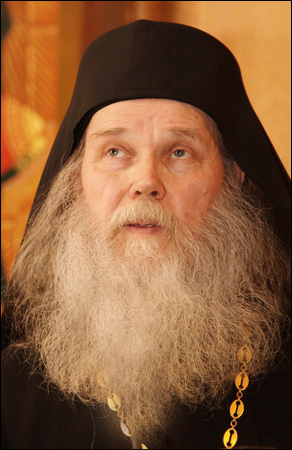 Archimandrite Nikon (Smirnov) We asked Archimandrite Nikon (Smirnov), who for many years served as rector of the Athonite Metochion in Moscow (where St. Aristokly’s relics are kept), to interpret the above-mentioned prophecy of the holy elder:
Archimandrite Nikon (Smirnov) We asked Archimandrite Nikon (Smirnov), who for many years served as rector of the Athonite Metochion in Moscow (where St. Aristokly’s relics are kept), to interpret the above-mentioned prophecy of the holy elder:
We can infer that these “newcomers with pigtails” are secular people with liberal principles and attitudes, when men, like women, grow their hair long and don’t have it cut. You look at someone walking in front of you from the back and cannot make out whether they are a man or a woman: today men wear earrings, women have taken a fancy to trousers, and little three-or four-year-old girls are decked out in jeans. Blurring out the God-defined boundaries is a very alarming sign. Why?
It all begins with small things, but then the nation becomes degraded, and same-sex “marriages” are officially legalized. Once perversion has been legitimized, the nation no longer has the criteria to discern between good and evil, and therefore it appears that everything is allowed! No society can live without ethics and morals. This confusion of good and evil is in fact a rebellion against the Law of God dictated by the Almighty to Moses: For all that do so are abomination unto the Lord thy God (Deut. 22:5). This wave is currently sweeping over the EU countries, but there are protests there, too.
As for Russia, the Lord has tempered justice with mercy here. Even outwardly changes are apparent. Churches are open, and everyone can attend services freely. The same is with monasteries and convents: those who have a desire for the monastic life are free to join them. There are no artificially state-imposed restrictions anymore. In my view, these changes indicate that God is with us, accepting us and drawing closer to us. The question is whether or not we are walking towards the Lord.

